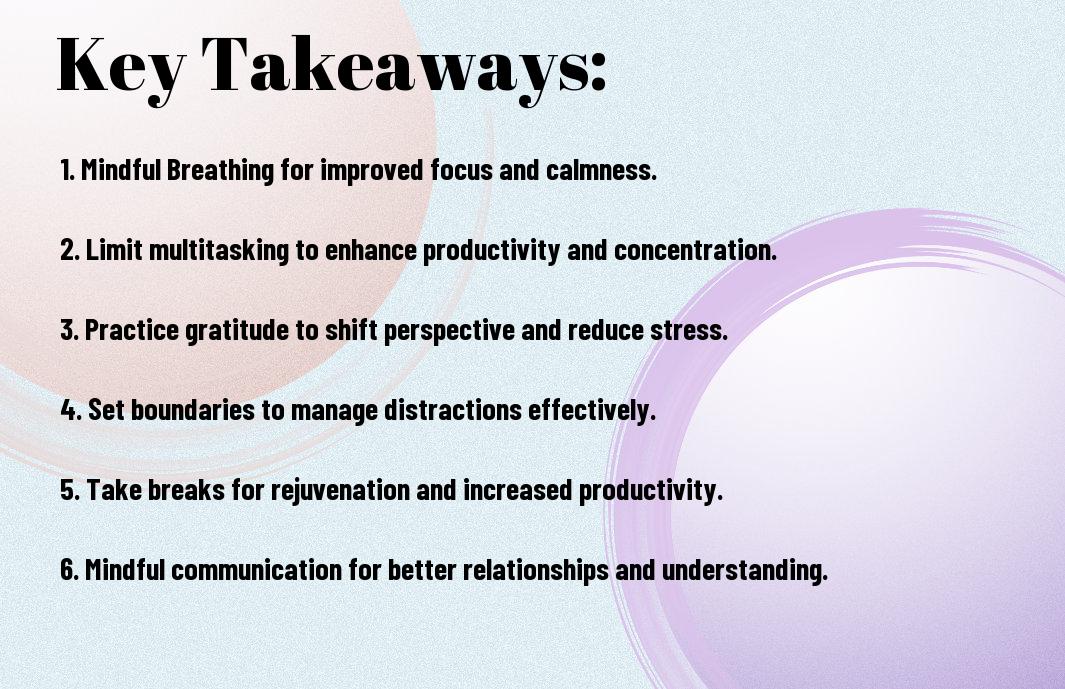Mindfulness is an imperative practice that can revolutionize your workday. By incorporating mindfulness techniques into your routine, you can enhance your focus and productivity.
In a world filled with distractions and constant stimuli, these 10 mindfulness steps will help you stay centered, calm, and efficient in your work environment.
From incorporating meditation breaks to setting clear intentions for each task, these strategies will empower you to tackle your workload with clarity and purpose.
By practicing mindfulness at work, you can cultivate a sense of presence and awareness that will positively impact your performance and well-being.
Discover how these 10 mindfulness steps can transform your workday and elevate your productivity to new heights.
Key Takeaways:
- Mindfulness practices can significantly boost focus and productivity at work.
- Setting intentions before starting work can help in clarifying priorities and staying on track.
- Regular mindful breaks throughout the day can recharge energy levels and improve mental clarity.
- Breathing exercises can help in calming the mind and reducing stress during busy workdays.
- Practicing gratitude for what you have accomplished can boost motivation and encourage a positive mindset at work.

Understanding Mindfulness
You may have heard about mindfulness in relation to meditation or stress reduction, but its benefits extend far beyond that. In the workplace, practicing mindfulness can significantly improve your focus and productivity.
By understanding the principles and science behind mindfulness, you can harness its power to enhance your performance at work.
Definition and Core Principles
Any individual can cultivate mindfulness by simply being present and fully engaged in the moment. It involves paying attention to your thoughts, feelings, bodily sensations, and the environment without judgment.
The core principles of mindfulness include awareness, acceptance, and non-reactivity. By embracing these principles, you can develop a greater sense of clarity and resilience in the face of challenges.
 The Science Behind Mindfulness and Concentration
The Science Behind Mindfulness and Concentration
Concentration is crucial for maintaining focus and productivity in a fast-paced work environment. Mindfulness practices have been shown to enhance concentration by training the brain to sustain attention on a specific object or task.
Studies have demonstrated that regular mindfulness meditation can increase the density of gray matter in brain regions associated with attention and concentration.
Science has also revealed that mindfulness can help reduce the impact of distractions and improve cognitive flexibility.
By sharpening your attention through mindfulness techniques, you can optimize your cognitive resources and boost your overall efficiency at work.
Getting Started with Mindfulness
After a hectic day at work, it’s easy to feel overwhelmed and scattered. But incorporating mindfulness practices into your daily routine can help you regain focus and boost productivity.
Mindfulness is about being present in the moment, without judgment, and can be a powerful tool to enhance your work performance.
Creating a Mindful Workspace
One crucial step to starting your mindfulness journey is creating a mindful workspace. Keep your desk clutter-free and organized to promote a sense of calm and clarity.
Consider adding elements like a plant, inspiring quotes, or calming colors to create a peaceful environment that can help you stay focused throughout the day.
Establishing a Daily Mindfulness Routine
Mindfulness is not just a temporary fix – it’s a skill that can be developed over time with consistent practice. Establishing a daily mindfulness routine is crucial to reaping the long-term benefits of this practice.
Set aside dedicated time each day for mindfulness activities such as meditation, deep breathing exercises, or mindful walking. These practices can help you cultivate a sense of presence and awareness that can carry over into your workday.
Mindfulness is a powerful tool that can help you enhance your focus, reduce stress, and improve your overall well-being.
By incorporating mindfulness practices into your daily routine, you can train your mind to be more attentive and engaged, leading to increased productivity and efficiency at work.
Daily mindfulness practices may seem simple, but their impact on your work performance can be profound. Make a commitment to prioritize mindfulness in your daily routine, and you will soon experience the positive effects on your focus and productivity.
Mindfulness Steps to Enhance Focus
Single-Tasking: The Power of Focus
Your ability to focus is a crucial element in enhancing productivity and achieving optimal results in the workplace. Single-tasking, the practice of concentrating on one task at a time without distractions, is a powerful technique to boost your focus.
By fully immersing yourself in one task and giving it your undivided attention, you can improve your efficiency and quality of work. Multitasking may seem like a time-saver, but it often leads to decreased focus and performance.
Embrace single-tasking to harness the power of focus and elevate your productivity levels.
Mindful Breathing Techniques for Concentration
Single-tasking can be paired with mindful breathing techniques to further enhance your concentration and focus.
Mindful breathing involves paying attention to your breath, focusing on the sensation of inhaling and exhaling, and bringing your mind back to the present moment whenever it starts to wander.
This practice not only improves your concentration but also helps in reducing stress and anxiety levels. By incorporating mindful breathing techniques into your daily routine, you can cultivate a calmer and more focused mind, enabling you to tackle tasks with clarity and efficiency.
It is important to set aside dedicated time each day to practice mindful breathing exercises. Start with just a few minutes of deep breathing and gradually increase the duration as you become more comfortable with the practice.
You can incorporate mindful breathing into your workday by taking short breaks to focus on your breath, helping you recenter your mind and enhance your ability to focus on the task at hand.
Strategies to Improve Productivity
Setting Mindful Goals and Intentions
With the hustle and bustle of the modern workplace, it’s easy to get caught up in a cycle of constant busyness without actually being productive.
Setting mindful goals and intentions can help you cut through the noise and focus on what truly matters.
By taking the time to reflect on your priorities and values, you can align your daily tasks with your long-term objectives, ensuring that every action you take moves you closer to your goals.
The Role of Mindful Breaks in Sustaining Productivity
An important but often overlooked aspect of productivity is the role of mindful breaks. In a world where we glorify being busy, taking regular breaks may seem counterintuitive to productivity.
However, research has shown that incorporating short, mindful breaks throughout the day can actually improve focus, creativity, and overall productivity.
By giving your mind a chance to rest and recharge, you can prevent burnout and maintain high levels of performance throughout the day.
Setting aside time for mindful breaks also allows you to check in with yourself, assess your energy levels, and make any necessary adjustments to your workflow.
Whether it’s taking a short walk, practicing deep breathing exercises, or simply staring out the window and letting your mind wander, these breaks can help you reset and come back to your tasks with renewed focus and clarity.
Integrating Mindfulness into Work Tasks
Once again, let’s research into the power of mindfulness in boosting focus and productivity in the workplace. One key aspect of harnessing mindfulness at work is integrating it into our daily tasks.
By incorporating mindfulness practices into our work routine, we can enhance our ability to stay present and engaged in our tasks, leading to improved efficiency and quality of work output.
Mindful Communication in the Workplace
Mindfulness in communication involves being fully present and attentive during interactions with colleagues.
This means actively listening without judgment, showing empathy, and responding thoughtfully rather than reacting impulsively.
By practicing mindful communication, we can foster better relationships, resolve conflicts more effectively, and enhance overall team collaboration.
Prioritizing Tasks with Mindful Decision Making
The process of mindful decision making involves pausing to reflect on our priorities, values, and goals before taking action.
By incorporating mindfulness into our decision-making process, we can avoid impulsive choices driven by stress or external pressures. Instead, we can make more intentional decisions that align with our objectives, leading to better time management and task prioritization.
It allows us to assess which tasks are truly important and deserve our immediate attention, helping us allocate our time and energy effectively.
By making mindful decisions about how we allocate our resources, we can ensure that we are focusing on tasks that align with our long-term goals and values.
Overcoming Common Challenges
Dealing with Distractions Mindfully
An inevitable part of the modern workplace is the presence of distractions that can hinder our focus and productivity.
Despite the constant influx of emails, notifications, and office chatter, it is crucial to cultivate mindfulness to manage these distractions effectively.
By practicing mindfulness, we can learn to acknowledge distractions without letting them consume our attention.
This allows us to gently redirect our focus back to the task at hand, promoting a state of deep concentration and productivity.
Managing Work-Related Stress Through Mindfulness
Mindfulness serves as a powerful tool for managing work-related stress, which can often stem from deadlines, performance pressure, or interpersonal conflicts.
By incorporating mindfulness practices into our daily routine, we can develop a greater awareness of our thoughts and emotions in moments of stress.
This heightened self-awareness enables us to respond to stressors in a calm and collected manner, fostering a more resilient and centered approach to challenging situations in the workplace.
Mindfulness not only helps us navigate work-related stressors more effectively but also promotes overall well-being by reducing stress levels and enhancing our ability to cope with pressure. By integrating mindfulness techniques such as deep breathing exercises, meditation, and body scans into our daily work routine, we can cultivate a greater sense of inner peace and balance amidst the demands of a fast-paced work environment.
Maintaining Mindfulness in the Long Run
Unlike quick fixes or temporary solutions, sustaining mindfulness in the long run requires consistent effort and dedication.
One way to ensure you stay on track is by actively tracking your progress and staying committed to your mindfulness practice.
Tracking Progress and Staying Committed
On your mindfulness journey, it is crucial to set specific goals and regularly assess your progress. Keeping a journal or using a mindfulness app can help you track your daily practice, reflect on your experiences, and identify areas for improvement.
Additionally, staying committed to a routine by carving out time each day for mindfulness exercises will reinforce the habit and make it easier to integrate into your daily life.
Continuing Education and Practice
On your path to long-term mindfulness, it’s crucial to continue educating yourself and deepening your practice. Attend workshops, read books, or participate in mindfulness courses to expand your knowledge and stay motivated.
Surrounding yourself with a supportive community of like-minded individuals can also enhance your mindfulness journey and provide encouragement during challenges.
Another way to foster mindfulness in the long run is by exploring different mindfulness techniques such as mindful breathing, body scans, or loving-kindness meditation.
Trying out new practices can prevent boredom and help you discover which techniques resonate best with you, leading to a more enriching and sustainable mindfulness practice.
Summing up
Hence, incorporating mindfulness practices into our daily work routine can significantly enhance our focus and productivity.
By following these 10 mindfulness steps, individuals can cultivate a more present and focused mindset, leading to a more efficient and effective workday.
It is crucial to make a conscious effort to apply these techniques consistently to fully harness their benefits and improve performance in the workplace.
FAQ
Q: What are the benefits of practicing mindfulness at work?
A: Practicing mindfulness at work can help improve focus, reduce stress levels, enhance productivity, enhance decision-making skills, and foster better relationships with colleagues.
Q: How can mindfulness improve focus at work?
A: Mindfulness techniques such as deep breathing, meditation, and staying present in the moment can help train your brain to stay focused on the task at hand, minimizing distractions and increasing productivity.
Q: What are some simple mindfulness exercises that can be practiced at work?
A: Mindful breathing exercises, body scan meditations, mindful walking, and taking short breaks to focus on the present moment are some simple mindfulness techniques that can be practiced at work.
Q: How can mindfulness help manage work-related stress?
A: Mindfulness can help individuals manage work-related stress by promoting relaxation, reducing anxiety levels, improving emotional regulation, and fostering a sense of calm amidst work pressures.
Q: How can mindfulness enhance productivity at work?
A: By cultivating mindfulness practices, individuals can enhance their cognitive abilities, boost creativity, improve problem-solving skills, and increase overall productivity by staying focused and present in their work tasks.

